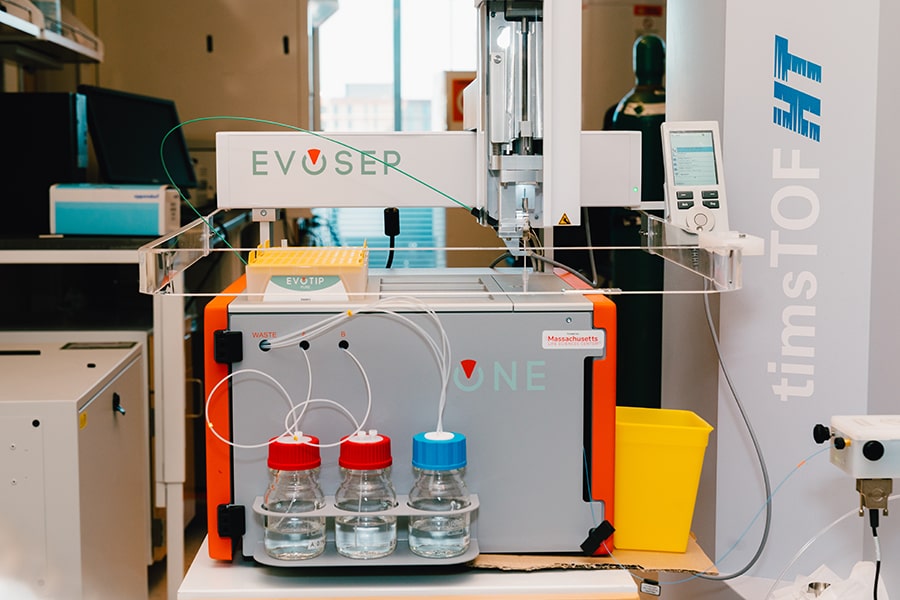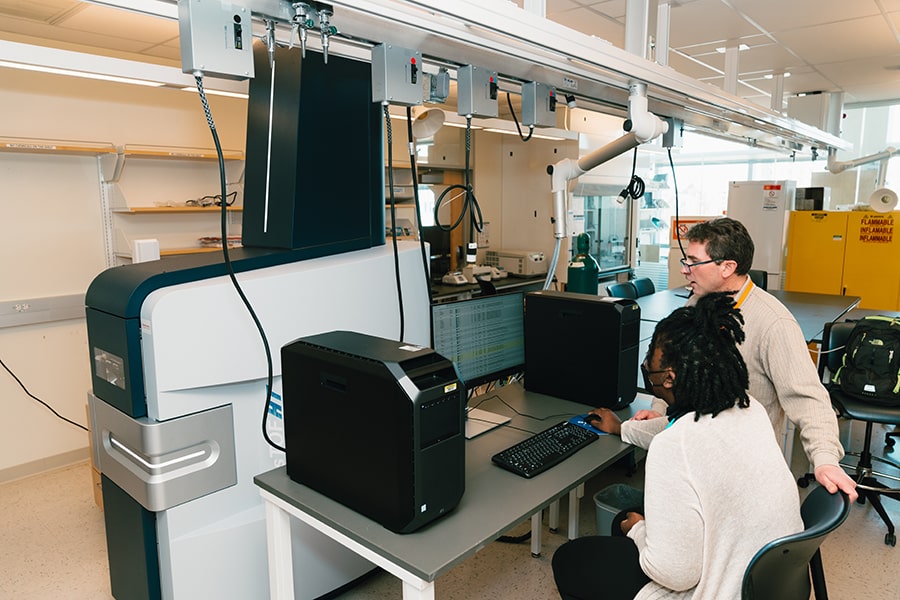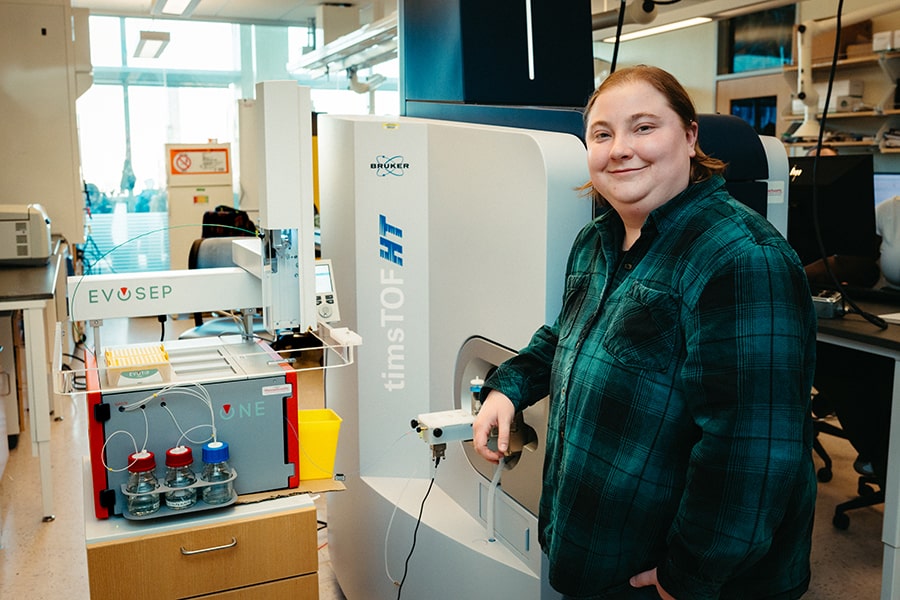- Home
- News
- Recent News
- The Proteomics Core Facility: A Catalyst for Collaboration
The Proteomics Core Facility: A Catalyst for Collaboration, Engagement, and Training
The Proteomics Core Facility has been offering mass spectrometry services using state-of-the art instrumentation since 2017.

Our Proteomics Core Facility serves both internal and external clients of the greater Boston biotech community and beyond. The core is led by Professor Jason Evans, an associate professor in the Chemistry Department, who has been at UMass Boston since 2001. The core facility is run under his direction by a team of graduate students led by Rachel Muriph and Mynaja Ferguson.
The centerpieces of the core facility are two state-of-the-art nanoflow liquid chromatography/mass spectrometry (LC-MS) instruments, both of which were purchased with funding from the Massachusetts Life Sciences Center (MLSC). The first instrument is a nLC-Orbitrap Fusion Lumos Tribrid mass spectrometer purchased in 2016. This was provided to us through the initial seed funding that supported the development of the Center for Personalized Cancer Therapy at UMass Boston. The second instrument is an nLC-timsTOF purchased in January 2023 with funds we received from MLSC through a Bits to Bytes award.
These instruments excel at analyzing complex samples obtained from cultured cells or tissue samples. The Orbitrap is a high-resolution mass spectrometer equipped with electron-transfer dissociation (ETD) capabilities allowing for customized analyses tailored to sample identity/complexity. On a typical HeLa cell digest, we confidently identify 4,000 unique proteins in 90 minutes. The timsTOF offers 4D separation by leveraging gas phase separation of ions based on their mobility. This, in conjunction with the speed of the TOF, yields 4,500 confident protein IDs in just 45 minutes.

Evans and Ferguson working in the Proteomics Core Facility. Image By: Javier Rivas
The Proteomics Core Facility has worked on a large variety of projects, such as antibody characterization, location of post-translational modifications, and characterization and quantification of proteins attached to nanoparticles. However, we specialize in measuring differential protein expression patterns. Proteins are the drivers of cellular function. Proteins that are differentially expressed in a disease state can provide a window to understanding the biological pathways that are impacted by the disease. These differentially expressed proteins are potential targets for developing a therapeutic that can relieve the symptoms of the disease.
The core facility has worked with many different clients, including small biotech start-ups, local hospitals and universities, larger biotech companies, and a handful of academic collaborators across the United States. Some of these interactions have led to research collaborations and MLSC-funded projects, where the MLSC provides funding to support new capital equipment for the core facility, and the company supports a salary for a postdoctoral research assistant to work on the project. We are in the middle of a three-year project with Pinetree Therapeutics that focuses on developing a cancer therapeutic. Another proposal was recently funded by MLSC with Covaris serving as our industry partner. This new award will improve and automate our sample preparation procedures, provide advanced computational performance for data analysis and support a new collaborative project between UMass Boston and Tufts University that focuses on designing nanoparticles for drug delivery. In addition to local biotech companies, we also engage in outreach to local high school students, providing them access to state-of-the-art instrumentations and mentorship otherwise inaccessible to them.
The formation of the Proteomics Core Facility at UMass Boston has been a catalyst for collaboration on internal research projects, for engagement with the local biotech community, and for specialized training of UMass Boston students. The core has been instrumental in the progression of numerous projects thus far and we look forward to continuing to serve the scientific community of greater Boston for many years to come.
Workforce Development
Rachel Muriph, a PhD student in the Chemistry Department, works in the Proteomics Core Facility.
"Working in the Proteomics Core Facilty has exposed me to countless different projects and clients. For example, the core has done work with many local biotech companies to aid in ongoing research into nanoparticle drug delivery systems, the same technology used in the Pfizer and Moderna COVID-19 vaccines.

Muriph in the Proteomic Core Facility. Image By: Javier Rivas
This work focuses on both payload delivery efficiency, which involved thoughtful and careful sample preparation, as well as characterization of the proteins that amass on nanoparticles when they are placed in biological fluids, such as when they come into contact with a patient’s blood during administration.
Working so closely with these clients, among many others, fosters relationships between UMass Boston and local biotech companies, which has helped me prosper as a collaborative researcher.
These collaborations, along with the guidance of the director of the Proteomics Core Facility, Professor Evans, has given me exposure to a myriad of scientific projects, each requiring a unique approach. Our core facility model offers collaboration-based services rather than a simple fee-for-service model. This has given me the opportunity to be involved in initial consultations with clients, experimental planning, collecting and analyzing data, generating reports, and finally meeting again with the client to present them with their data.
Throughout my time working in the Proteomics Core Facility my benchtop skills, analytical mind, business skills, and customer service training have been expertly curated to make me a well-rounded and appealing applicant for job opportunities postgraduation.”

Proteomics Core Facility Director, Department Chairman, Associate Professor of Chemistry